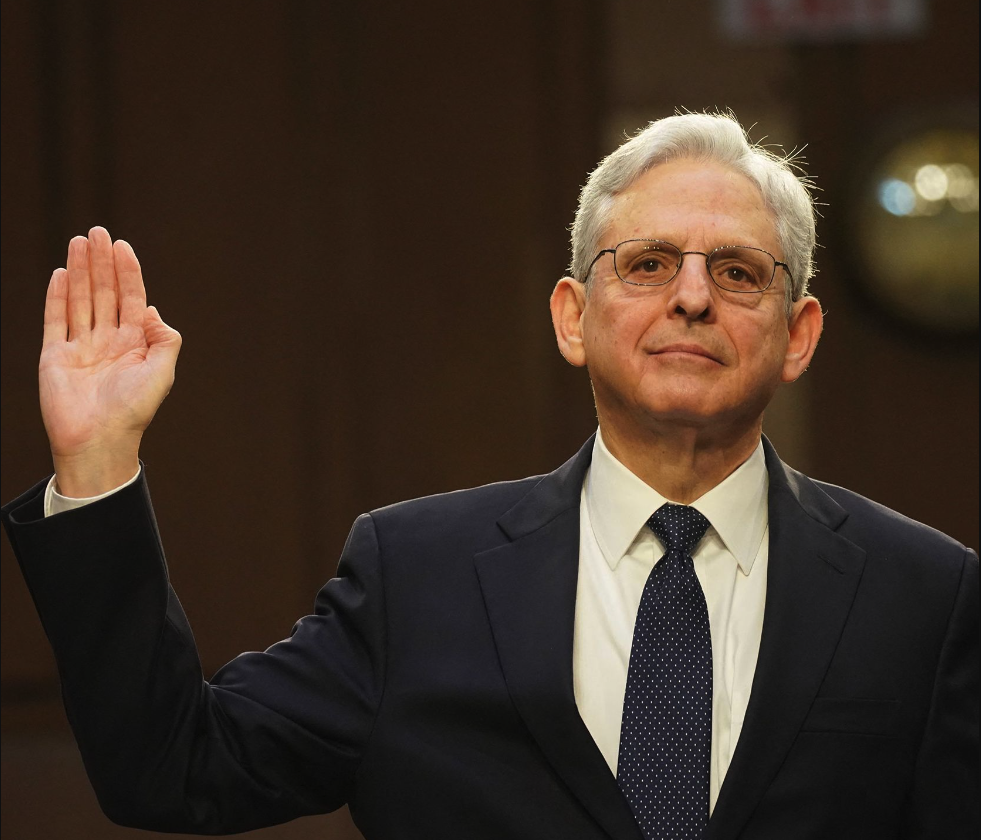
Attorney General Merrick “Nostalgia” Garland swears to tell the truth before the Senate Oversight Committee: NAJ screen shot
By Glynn Wilson –
WASHINGTON, D.C. — A detailed investigative report in Monday’s Washington Post just confirmed much of what I have been warning about for months, no years.
Since being appointed by President Joe Biden, and confirmed by the U.S. Senate, Attorney General Merrick Garland was too afraid of appearing to be politically partisan to do his most important job even by his own admission: “… bringing to justice those responsible for the attack on the U.S. Capitol on Jan. 6, 2021.”
It also shows that FBI director Chris Wray, a Republican Trump appointee, quashed investigations of Trump and his top associates because he wanted to remain on the job as FBI director under President Joe Biden. So much for honorable statements about the independence of the United States Department of Justice. Fear of what Trump’s partisan, political base might think and careerism take precedence over justice in this Justice Department.
If you are a subscriber to the Post‘s paywall, you can read the long, detailed and sometimes confusing story for yourself: FBI resisted opening probe into Trump’s role in Jan. 6 for more than a year: In the DOJ’s investigation of Jan. 6, key Justice officials also quashed an early plan for a task force focused on people in Trump’s orbit
Meanwhile let me summarize the key findings for you in a way more members of the mass public may understand, sprinkling in some of our key coverage for review and research purposes. If you followed this news in The Post, The New York Times, on broadcast network or cable news or better yet, in the New American Journal, you may recall Michael R. Sherwin, then-acting U.S. attorney for the District of Columbia, appearing on CBS’s “Sixty Minutes” back in March, 2021. He disappeared not long after that, and I’ve long wondered what in the hell happened to him. The Post story reveals that he was ghosted out of the department for going too far too fast on television.
This is what I reported at the time:
Acting U.S. Attorney Hints of Charging Capitol Insurrectionists With Sedition and Murder
The acting U.S. attorney leading the investigation into those involved in the January 6 Capitol insurrection appeared on CBS’s “Sixty Minutes” on Sunday and admitted that prosecutors are looking into former President Donald Trump’s role in inciting the violent riot, that some of the conspirators who planned the attack in advance could ultimately be charged with sedition to overthrow the government, and some could be charged with murder for the death of a Capitol Police officer.
Michael R. Sherwin, a federal prosecutor from Miami held over in the Washington, D.C. bureau of the Department of Justice by the Biden administration to continue the investigation, talked about witnessing the rally and riot in person while out for a jog.
As attorneys often are in interviews, Sherwin did not come right out and say Trump would be charged, or that some members of right-wing militia groups would be charged with sedition. But when pressed by Scott Pelley, he said the prosecution team is looking at the evidence and have not ruled that out.
Sherwin restated claims he made shortly after the attack that prosecutors were examining the conduct of the former president, who urged his supporters to attend the rally and fired them up with baseless claims of a stolen election to “fight like hell.”
“It’s unequivocal that Trump was the magnet that brought the people to D.C. on the 6th. Now the question is, is he criminally culpable for everything that happened during the siege, during the breach?” Sherwin said. “We have people looking at everything.”
He also admitted under questioning that evidence the government obtained most likely meets the legal bar necessary to charge some of the suspects with sedition.
“I personally believe the evidence is trending toward that, and probably meets those elements,” Sherwin said. “I believe the facts do support those charges. And I think that, as we go forward, more facts will support that.”
The Washington Post investigation found that more than a year would pass before prosecutors and FBI agents jointly embarked on a formal probe of actions directed from the White House to try to steal the election they were calling “stolen.”
“Even then, the FBI stopped short of identifying the former president as a focus of that investigation,” the Post reports. “A wariness about appearing partisan, institutional caution, and clashes over how much evidence was sufficient to investigate the actions of Trump and those around him all contributed to the slow pace. Garland and the deputy attorney general, Lisa Monaco, charted a cautious course aimed at restoring public trust in the department while some prosecutors below them chafed, feeling top officials were shying away from looking at evidence of potential crimes by Trump and those close to him…”
Later in the story, according to the Post‘s analysis: “Whether a decision about Trump’s culpability for Jan. 6 could have come any earlier is unclear. The delays in examining that question began before Garland was even confirmed. Sherwin, senior Justice Department officials and Paul Abbate, the top deputy to FBI Director Christopher A. Wray, quashed a plan by prosecutors in the U.S. attorney’s office to directly investigate Trump associates for any links to the riot, deeming it premature, according to five individuals familiar with the decision. Instead, they insisted on a methodical approach — focusing first on rioters and going up the ladder.”
Is it not also possible that Wray’s political party affiliation, and also owing his promotion to Trump, could have played a role in Wray’s decision to quash an investigation of Trump and his top advisers? The Post doesn’t say.
“… when it came to the Jan. 6 investigation, agents noticed that Wray did not travel the five blocks from FBI headquarters to the bureau’s Washington field office running the investigation for more than 21 months after the attack. In that time, people familiar with the investigation said, he had never received a detailed briefing on the topic directly from the assistant director in charge of the office, Steven D’Antuono.”
Two days after the Capitol attack, the FBI began announcing charges that were meant to send a message, the Post reported. Agents arrested the man pictured propping his feet on House Speaker Nancy Pelosi’s desk. The next day it was the man in the horned headdress who was known as the “QAnon shaman.”
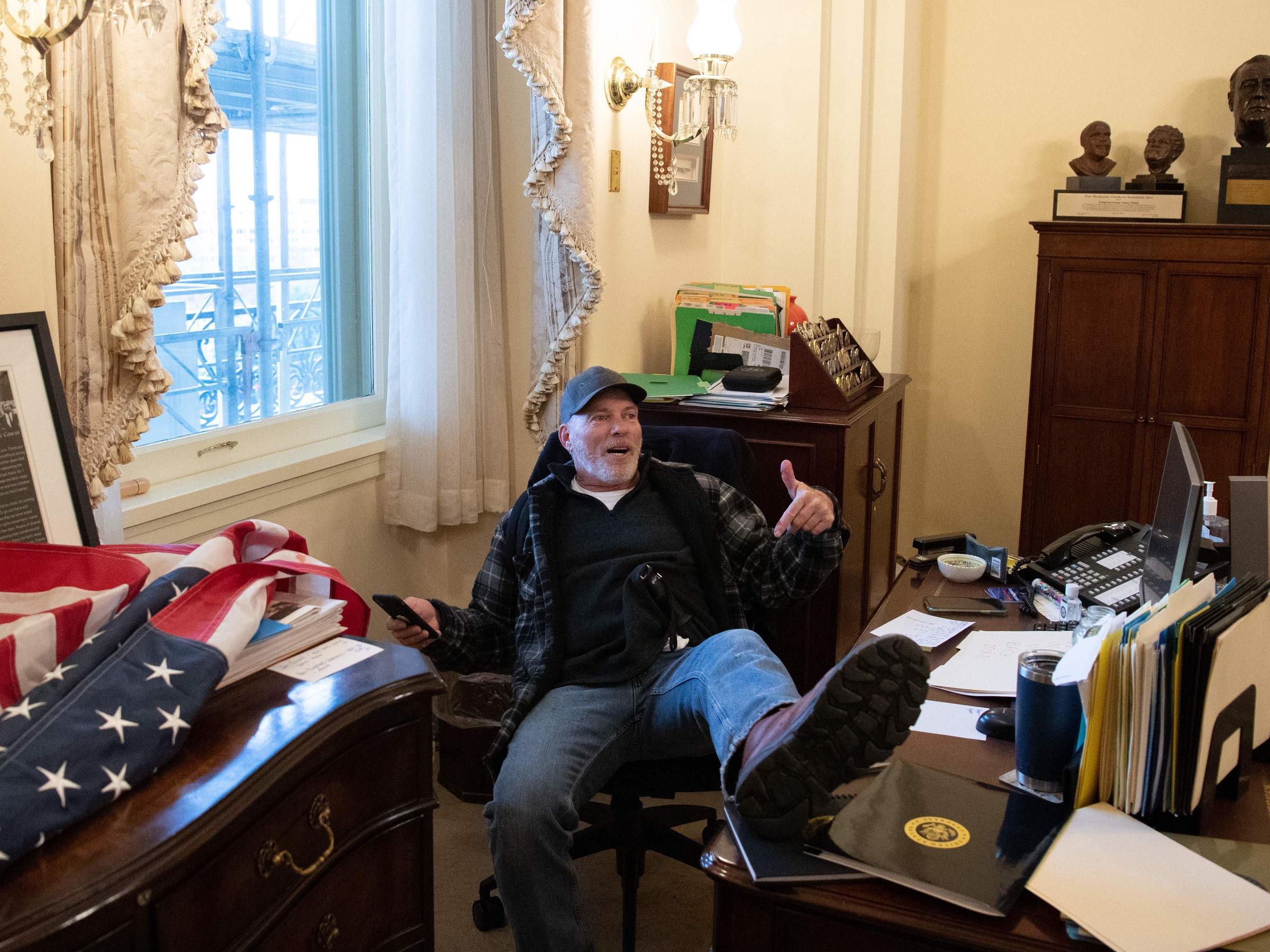
Richard Barnett, a supporter of President Donald Trump sits inside the office of US Speaker of the House Nancy Pelosi as he protest inside the US Capitol in Washington, DC, January 6, 2021: Google
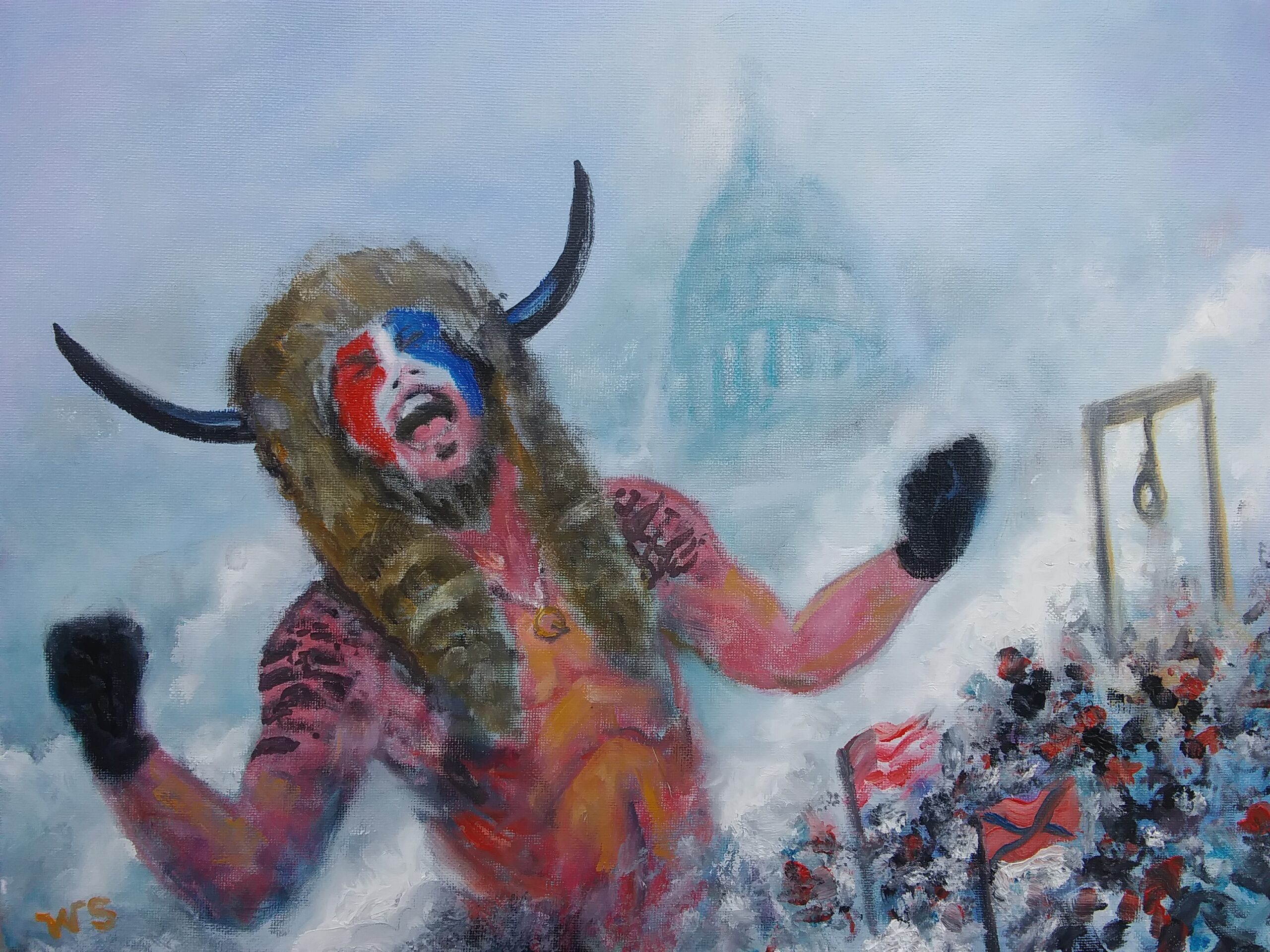
Q Takes the Capitol, a New American Journal graphic by artist Walter Simon, depicts this golden calf of the Shaman of Qanon in his bison horn headdress, flying a flag with the slogan, “Quo unus nostrum it, eo universi imus.” The saying is inspired by the coming of age at sea saga “White Squall” using a lame slogan from the Albatross ship’s bell, “Where we go one, we go all.”
The goal was to “show confidence in the system,” Sherwin told a colleague.
Beyond short written or video statements denouncing the Jan. 6 violence in general, however, neither Wray nor then-acting AG Rosen came out publicly to reinforce that message.
Fake Electors
In the related investigation of fake electors put forward by Trump’s people, something that was a key focus of the House Select Committee Investigating the Capitol attack, the FBI and the Justice Department “declined to investigate … for nearly a year.”
The Post makes excuses for Garland.
“The Justice Department’s painstaking approach to investigating Trump can be traced to Garland’s desire to turn the page from missteps, bruising attacks and allegations of partisanship in the department’s recent investigations of both Russia’s interference in the 2016 presidential election and Hillary Clinton’s use of a private email server. Inside Justice, however, some have complained that the attorney general’s determination to steer clear of any claims of political motive has chilled efforts to investigate the former president.”
“You couldn’t use the T word,” said one former Justice official briefed on prosecutors’ discussions.
The Post‘s account is based on internal documents, court files, congressional records, handwritten contemporaneous notes, and interviews with more than two dozen current and former prosecutors, investigators, and others with knowledge of the probe. Most of the people interviewed for this story spoke on the condition of anonymity to discuss internal decision-making related to the investigation.
It shows that there were consequences to moving at such a slow pace.
“For many months after the attack, prosecutors did not interview White House aides or other key witnesses, according to authorities and attorneys for some of those who have since been contacted by the special counsel. In that time, communications were put at risk of being lost or deleted and memories left to fade.”
It also drops in a line about the investigative problems caused by the collusion on the part of the Capitol Police during the insurrection, although it is not explicitly called that or explored any further by the Post.
“Outnumbered and desperate to regain control of the Capitol following the Jan. 6 attack, Capitol Police had for the most part (?) let the rioters walk away. The task of identifying the thousands of attackers — let alone building cases against them — fell to a Justice Department whose leadership was in transition.”
For the most part? They let them all simply walk out of the Capitol like tourists, and didn’t arrest anybody! A number of reports and videos confirmed that Capitol Police officers removed barricades to let them on the Capitol grounds to approach the steps, let them in doors including the door to the Senate chamber, and then escorted them out and away without so much as handcuffing one of them?
Trump Co-Conspirators
Later on, a plan to focus on Trump’s orbit was batted down again, the Post reports.
“… a group of prosecutors led by J.P. Cooney, the head of the fraud and public corruption section at the U.S. attorney’s office, argued that the existing structure of the probe overlooked a key investigative angle. They sought to open a new front, based partly on publicly available evidence, including from social media, that linked some extremists involved in the riot to people in Trump’s orbit — including Roger Stone, Trump’s longest-serving political adviser; Ali Alexander, an organizer of the “Stop the Steal” rally that preceded the riot; and Alex Jones, the Infowars host.”
***
“Some prosecutors even had the impression that Trump had become a taboo topic at Main Justice,” the Post reports. “Colleagues responsible for preparing briefing materials and updates for Garland and (assistant AG) Monaco were warned to focus on foot soldiers and to avoid mentioning Trump or his close allies.”
***
Later on, public knowledge of the actions in the White House that precipitated Jan. 6 was building. A book by The Post’s Bob Woodward and Robert Costa detailed a memo by Trump legal adviser John Eastman purporting to show a legal basis for Pence to block the certification of Biden’s win on Jan. 6. It called for the vice president to rely on fake slates of electors for Trump from seven states to declare that the election outcome was in dispute. A separate Post story also revealed numerous details of a “war room” that Trump’s closest advisers had been running out of the Willard hotel. The president’s backers used the space as a hub to push members of state legislatures to take steps to support Eastman’s plan, and to urge Pence not to certify the results.
***
Once Matthew Graves was appointed and confirmed as deputy AG in D.C. for national security, his office was stretched thin. So he transferred a federal prosecutor from Alabama working in Greenbelt, Maryland to his office, Thomas Windom, 45, who had won plaudits for investigating a domestic extremist group called “The Base” and had appealed to higher-ups for a move.
I wrote about it at the time, in part because Windom was from Alabama.
Related: Pressure Mounts on Justice Department to Bring Charges Against Trump
The Post story doesn’t mention it, but at the time we learned of Windom’s appointment, the pressure on the Garland and the Justice Department to bring charges against Trump for inciting a violent insurrection and leading a seditious conspiracy to overturn a democratic election got turned up by Wyoming Republican and Co-Chair of the House Select Committee investigating the attack, Liz Cheney, who on the Sunday before Independence Day went on national television and poured hot grease on the fire to get the squeaky wheel turning.
Wyoming Republican Liz Cheney strongly indicated Sunday in a national television interview that multiple criminal referrals were in the offing against former President Donald Trump, and gave the go ahead nod to the Department of Justice not to wait.
“The Justice Department doesn’t have to wait for the committee to make a criminal referral,” Cheney said on ABC’s “This Week.” “And there could be more than one criminal referral.”
Cheney assured the country that the House investigation is not partisan, and hinted that Justice Department prosecutors should not refrain from charging the former president out of concerns about political optics — if the evidence warrants criminal prosecutions.
“I think it’s a much graver constitutional threat if a president can engage in these kinds of activities, and the majority of the president’s party looks away, or we as a country decide we’re not actually going to take our constitutional obligations seriously,” Cheney said.
***
After that, with Graves’s support, Windom soon approached the FBI’s Washington Field Office for additional help, according to the Post‘s reporting.
At a meeting in November 2021, Windom asked the assistant director in charge of the office, Steven D’Antuono, to assist in a grand jury investigation, which would include issuing a subpoena to the Willard hotel for billing information from the time when Trump lawyer Rudy Giuliani was working with Steve Bannon, Boris Epshteyn and other Trump associates in their “war room.” Stone was staying there around Jan. 6 as well.
D’Antuono was skeptical, according to the Post. The investigative track sounded eerily similar to the Cooney proposal that had been shot down in February, he later confided to colleagues.
“I’m not serving subpoenas on the friggin’ Willard,” D’Antuono told Windom, according to a person familiar with their discussions. “You don’t have enough to issue subpoenas.”
Windom seemed surprised at the flat rejection, according to people familiar with the meeting. D’Antuono offered instead to give Windom full access to the FBI’s trove of evidence about Oath Keeper and Proud Boy extremists involved in the riot. Maybe Windom would find a communication or financial link between rioters and Trump deputies, D’Antuono suggested. The two also briefly discussed fake electors, but the FBI wasn’t ready to move forward on that topic either. Windom thanked him and left.
It is not clear what happened to Windom after that, although according to the Post‘s report, he is apparently still there, now working for special counsel Jack Smith.
Judge Chides DOJ
But another development came along, in addition to the Select Committee investigation, to get the attention of DOJ prosecutors.
U.S. District Judge David O. Carter issued a ruling addressing scores of sensitive emails that Trump’s lawyer Eastman had resisted turning over to the House select committee. After reviewing the documents privately, Carter wrote that the actions by Trump and Eastman amounted to “a coup in search of a legal theory” and that “the illegality of the plan was obvious.”
Carter, who was appointed by President Bill Clinton, took the opportunity to express frustration with the pace of the criminal investigation.
“More than a year after the attack on our Capitol, the public is still searching for accountability. … If the country does not commit to investigating and pursuing accountability for those responsible, the Court fears January 6 will repeat itself.”
FBI Finally Gets Onboard
In April 2022, more than 15 months after the attack, Wray signed off on the authorization opening a criminal investigation into the fake electors plot.
“Still, the FBI was tentative: Internally, some of the ex-president’s advisers and his reelection campaign were identified as the focus of the bureau’s probe, but not Trump.”
Trump announced he was running for president on March 17, 2023.
Over the next three months, subpoenas to former Trump campaign and White House officials sought information not only on fake electors but also on Trump’s post-presidential fundraising efforts, hinting at how wide-ranging the investigation had become, the Post reports.
Garland Punts, Appoints Jack Smith
But it all came to a halt on Nov. 18, when Garland abruptly summoned to Main Justice the D.C.-based prosecutors working on the Jan. 6 conspiracy as well as those who had already gathered extensive evidence of Trump concealing classified records at his Mar-a-Lago resort. The attorney general told them that to ensure the appearance of independence into the two probes of a potential Biden rival, he would appoint a special counsel later that day. While the prosecutors could choose their next steps, Garland said he hoped they would continue the work under Smith.
The Post story ends abruptly with one thing we already know, and one thing we didn’t know for sure.
Related: Trump Indicted for Mishandling Classified Documents and Conspiracy to Obstruct Justice
As Trump pleaded not guilty to those charges in federal court in Miami, Smith’s investigation into efforts to steal the election continued, according to the Post.
Meanwhile Michael McDonald and Jim DeGraffenreid, the chairman and vice chairman of the Nevada Republican Party who had signed a document claiming to be electors for Trump, entered the area of the D.C. federal courthouse where a grand jury has been meeting on cases related to Jan. 6.
So the grand jury is still in session. That investigation is still ongoing.
The country waits to find out when the next shoe will drop.


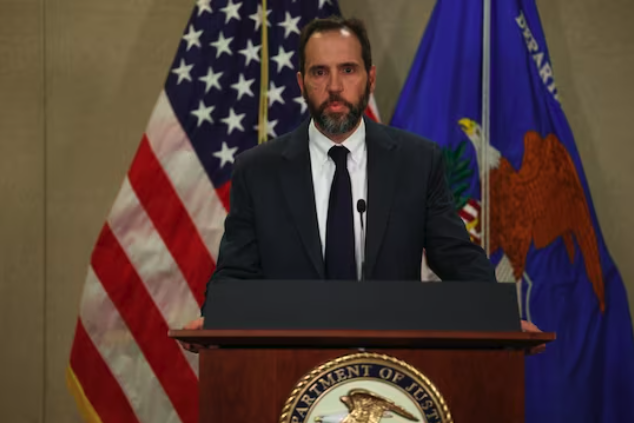





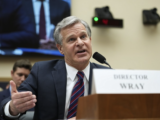






It’s beyond embarrassing for the DOJ, isn’t it? We were misled into believing that no man is above the law, but they did everything to quash the investigation until the J6 Committee came out ahead of them, probably embarrassing them into action. The fake electors should have been followed up immediately. Shame on them for not doing their job!